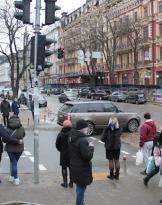Uzbekistan is a particular country in everything: together with the Liechtnestein it is the only one in the world that is doubly landlocked, that is, it borders with countries which in turn are surrounded only by land. It is the heart of the heart of central Asia, a stationary plaque of the former USSR, caught between modernity and Islam.
Already at Xalqaro Airports of Tashkent we understand the trend: the forms for the customs are almost only in Cyrillic.
Behind the alphabet there is a long story, straddling colonialism and independence. Uzbekistan, the most populous among the 5 Asian republics of the former USSR, in the '91 followed the course of the other pieces fleeing from the Red Empire, where the work of derussification was initially implacable: from the Cyrillic it is returned to the Latin alphabet; the symbols linked to the former colonizer have been canceled. The first to pay the price were the remains of communism, replaced by the heroes of the Uzbek nation, recovered from the centuries. Timur stands out on all, the Tamerlane buried in the mausoleum of Samarkand, made epic by Alexander the Great and catchy by Roberto Vecchioni.
And it is in Samarkand that one understands many things about O'zbekiston, written like this in huge patriotic inscriptions along the railroad between the city and the capital Tashkent.
Samarkand is actually a city with a Tajik majority, which thanks to the follies of Stalin was given to Uzbekistan. All the men with the traditional hat in the shape of panettone still demonstrate it today on the streets of the city: once they were Soviets, today they have become Uzbeks, but in reality they are Tajiks, of Iranian lineage as it is understood from the somatic traits and the flag of Tajikistan, less than 50 km.
And in Samarkand was born Karimov, the country's master father, who died during these hours or maybe these days. His name, with the Russian suffix and the Islamic root, represented all the contradictions left afloat by History in the last 25 years.
A former strong man of Moscow for Uzbekistan in the days of communism, he remained president of the new independent nation for a quarter of a century. In the silence of the steppe he has ground power, keeping a bizarre country around him and his family, suffocated by the legacy of Soviet monocultures but forced to move after years of immobility.
In the West a system like the Uzbek one is called dictatorship. Parliament, in effect, is like the fourth man in football games: even if he observes, he is basically out of the game. Without crossing the country, however, there is the risk of saying amenity and not understanding it enough.
Tashkent's independence pushes initially looked to the west. Uzbekistan had even made itself available for the war in Afghanistan, surrendering bases to NATO. Until a few years ago in Termez, along the southern border, the hotels were all occupied by the staff of the Luftwaffe on a mission for theISAF.
The American enticements have been in for a while, before coming up against the reality of the facts. Completely moving away from Moscow for Karimov and his family was actually impossible. Economic dependence, exasperated by the Divide and conquer Soviet imposed on the productions of the individual republics, has created an irreplaceable bond over time. The signs are still all on the shores of Lake Aral that no longer exists in the name of the cotton god ...
Balance has been substituted for the desire to escape de facto which suspended Uzbekistan for two decades: "No longer slaves of Russia; not yet something else ".
What will happen now that the Karimov era is over? Will the balance change in the heart of Asia?
Easy to expect a man near Moscow. It is easy to imagine that it is an opportunity for a young politician, close to the new Eurasian ambitions of the Kremlin.
Meanwhile, Uzbeks will remain halfway between tradition and the future, between past and hope.
In a train seat, a blond man with blue eyes drinks tea, offered by the most efficient Uzbekistan Railways. On TV Googoosha, Karimov's daughter, mixes between Laura Pausini, a snake charmer and the turbo folk Balkan. The man is used to it and does not care.
The 1 September was National Independence Day but he, like other millions of citizens, did not celebrate it. All the children of Russian settlers (who today do not even have ties to Russia) feel out of place. With their olive-gray faces with almond-gray eyes and the wrestling hills of the Mongol-Tatar Uzbeks, they have little to see. To understand just walk on the carpets of the train, which meanwhile approaches Buqara. Or simply enter one of Tashkent's 4 metro lines and walk around, under the watchful eye of the ubiquitous cops, with their blue-green uniforms.
Uzbekistan is all here: a nation suspended between the advertisements written in Cyrillic (hard to die) and those in the Latin alphabet (hard to come back).
In the warm and dry silence of Tashkent, in the imperial avenue Shota Rustaveli, pass an old-fashioned cubic trolleybus. No need to write: you understand everything by eating one shashlyk in the company of a sluggish taxi driver or in front of the fruit of the bazaar, between sellers with clove eyes and the face burned by the sun. Just drink one Baltika Russian in front of a minaret to realize that this is the center of an inextricable knot: the tangle made of silk and hemp that holds together the East and the West of the world.
(photo: author)












